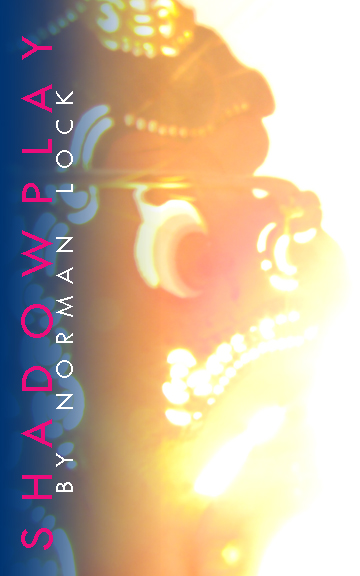
Shadowplay by Norman Lock
ISBN 978-0-9637536-3-2 | Fiction | 138 pages | $13
Winner of the 2010 Dactyl Foundation Literary Fiction Award!
We are unable to process orders here at this time… technicians are working on the problem.*
Review on Goodreads.
In Java, a master of the shadow-puppet theater seeks to possess-by his art-a woman, who perishes as though by the contagion of his unnatural desire. Shadowplay is a meditation on story-telling as an act of seizure, a parable of obsession and of the danger of confounding the real with its representations.
Praise for Shadowplay
Stories compensate for lives unlived. They are what Norman Lock, or his avatar Guntur, calls shadows, negative reflections on a backlit screen, comprising, through artistry and brief illumination, ghosts. Lock’s teller is imprisoned by darkness, captivated by warriors and princesses no longer, if ever, living. Death becomes a distance from which the voices of these unliving return. It is a journey as delicious as it is threatening.
—R.M. Berry
In the Dickensian tradition, Lock is adept at writing about places he has never been. He develops exotic lexicons of objects to stage his dramas. Pure objects, the words for them as portrayed in other books & art, unencumbered by the reality of the objects themselves… this is the brilliance of Lock — he mines the unknown or underknown for gems whose value is not relevant to the soil they were dug up from, for no other reason othen than in the name of art.
—Derek White
Just as a dalang retells ancient and iconic stories in his puppet-theatre, Shadowplay is itself a fable that stages the storyteller’s struggle between imagination and reality, experience and its record… Mistaking the shadow for the object from which it is cast, [Lock] illustrates the fact that the narratives we use to make sense of the world sometimes do so at the expense of our experience of it.
—Rain Taxi Review of Books
Lock’s language reflects the fabulous nature of the myth, intricate in description but never hard to understand, full of repeated images that, however simple, resonate deeply within the story.
—The Quarterly Conversation
Lock …evokes a deeply sensual world in which the smell of cinnamon all but sings in the breeze and the sea beckons like a lover… Shadowplay is informed by so many stories… that I initially feared I’d need to haul out my old Bullfinch’s Mythology and a dozen other reference works. But I didn’t. The novel stands on its own and does its tricky work unaided, like the afterlife of a dream.
—The Brooklyn Rail
Storytellers remind us that data retrieval is really a kind of betrayal, that truth and meaning are elusive, and that we see our selves, our relationships, our surroundings, as if through curtains. Norman Lock’s Shadowplay penetrates these diaphanous folds by casting light on the folly of irreconcilable love, the melancholic ache of nostalgia, and the burning yearning of art, of making something out of nothing… Swathed in darkness, Lock traverses liminal realms with glassine sentences reminiscent in form and substance of the like found in Gene Wolfe’s and Ursula K. Le Guin’s fiction, sentences you may be tempted to set off into line-broken verse. Shadowplay is another of the master locksmith’s nested boxes whose evocative, ensorcelling prose will withstand multiple readings, especially if read aloud.
—Review of Contemporary Fiction
[A] dense fable, mixing magic realism with self-reflexivity. The entire story is given to us in miniature at the beginning, such that the novella itself is really a constant retelling–a folding and refolding–rather than an unfolding… This plot unfurls slowly: it starts, stops, returns and starts again, usually with a new detail, or sometimes less detail, sometimes abstracted, sometimes enlarged. The effect is of narrative feathering, one moment being layered on top of another until the whole body is finally covered… Lock’s Shadowplay is a masterful rendering of the life of one story teller, trying desperately to fit within the intricate pattern of tradition, daring to transcend it by embracing it too much, until he is finally becomes a shadow in the story… an enchanting ritual of forms whose beauty will linger in the memory for a very long time.
—Winner of the 2010 Dactyl Foundation Literary Fiction Award
Praise for Norman Lock
Lock allows us to see the world through an Other’s eyes in such a way that by the end the difference between us…seems little more than a thin sheet of paper, if even that.
—Brian Evenson
Wise up and get all you can of Lock. His writing was written by a writer exquisite in the singularity (read for this “genius”) of his utterance.
—Gordon Lish
[Lock’s] prose is melodial, and alert to every signal from the unseen.
—Gary Lutz
All hail Lock, whose narrative soul sings fairy tales, whose language is glass.
—Kate Bernheimer
About Norman Lock
Norman Lock has written novels and short fiction as well as stage, radio and screen plays. He received the 1979 Aga Kahn Prize given by The Paris Review. He is a recipient of a 1999 fellowship from the New Jersey Council on the Arts and a 2009 fellowship from the Pennsylvania Council on the Arts-both for fiction. His novel The King of Sweden was recently published by Ravenna Press. Norman lives in Philadelphia with his wife, Helen.![]()
More information available at : http://www.normanlock.com/
